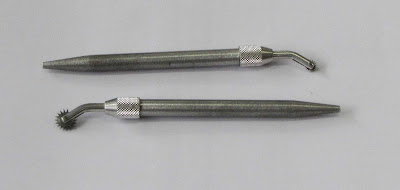Additional notes:
Light box requirements
Flexibility
Top surfaces
Lighting

 |
| Example of broken shelves |
 |
| Cutting a shelf with a hand saw |
 |
| 25mm vermiculite board |
 |
| 25mm ceramic fibre board |
 |
| Soft fire brick |
 |
| 3mm fibre paper |
Occasionally you need to re-fire a piece that already has holes drilled into it. The smaller holes tend to close up or reduce in diameter when they are larger. There is a method to resist this and still have a neat smooth hole.
To keep the holes open during a re-firing, cut a strip of Thinfire a little thinner than the thickness of the glass to be fired, roll it up tightly and put it into the hole to be kept open. Starting the wrapping around a pencil or pen makes the start easy and the roll can be tightened by holding the centre and pulling the end.
Put the roll into the hole and allow it to expand to fill the hole. It does not have to be solid. If the roll is as high or higher than the surrounding glass there is a tendency to get spikes.
This works fine on 6mm and thicker glass, but I have never tried it on 3mm glass. No reason why it shouldn't work though in my estimation if you can cut and manipulate 2mm strips of fibre paper.

The commonly used designation for grits has become the gauge This is a confusing measure as it increases in number as the size of the material decreases in size. This is because the number of wires per unit increases with decreasing size and the gauge refers to the number of wires used to sieve the material.
In an attempt to indicate the actual sizes of material refered to by the gauge sizes, I have used part of a standard table of equivalents.
12 gauge is 1.7mm or .0661inch
14 gauge is 1.4mm or .0555inch
16 gauge is 1.18mm or .0469inch
18 gauge is 1mm or .0394inch
20 gauge is .85mm or .0331inch
25 gauge is .71mm or .0278inch
30 gauge is .6mm or .0234inch
35 gauge is .5mm or .0197inch
40 gauge is .425mm or .0165inch
45 gauge is .355mm or .0139inch
50 gauge is .3mm or .0117inch
60 gauge is .25mm or .0098inch
70 gauge is .212mm or .0083inch
80 gauge is .18mm or .007inch
100 gauge is .15mm or .0059inch
120 gauge is .125mm or .0049inch
140 gauge is .106mm or .0041inch
170 gauge is .09mm or .0035inch
200 gauge is .075mm or .00295inch
230 gauge is .063mm or .0025inch
270 gauge is .053mm or .0021inch
325 gauge is .045mm or .0017inch
400 gauge is .038mm or .0015inch
450 gauge is .032mm or .0012inch
500 gauge is .025mm or .001inch
635 gauge is .02mm or .0008inch